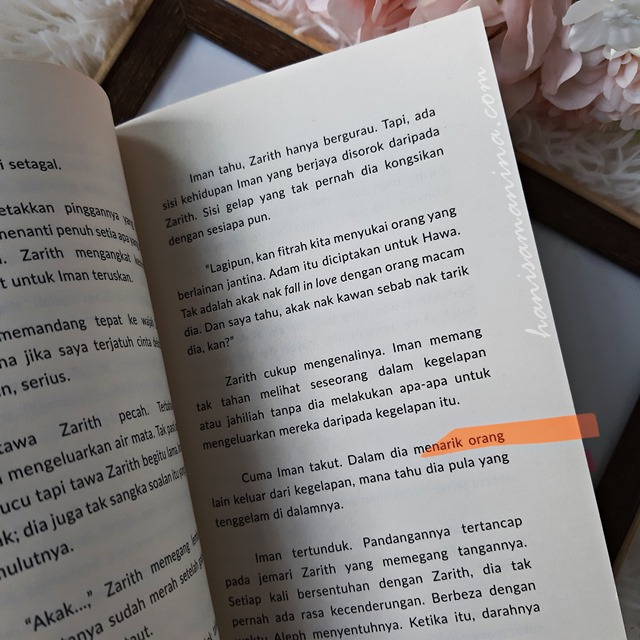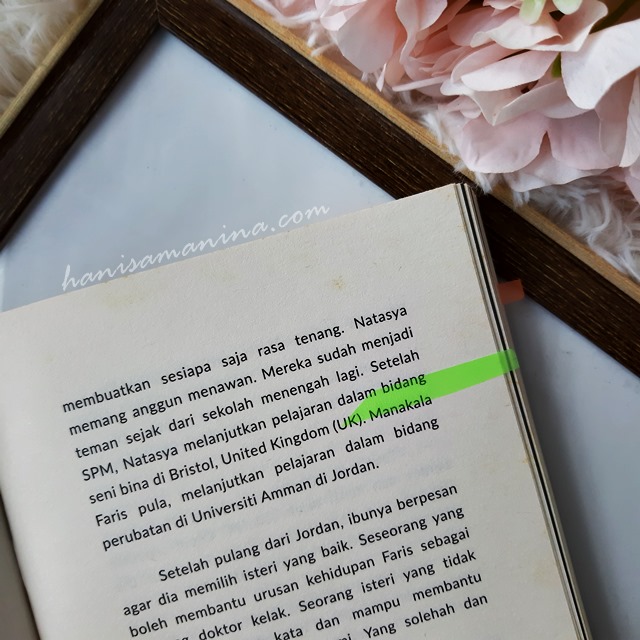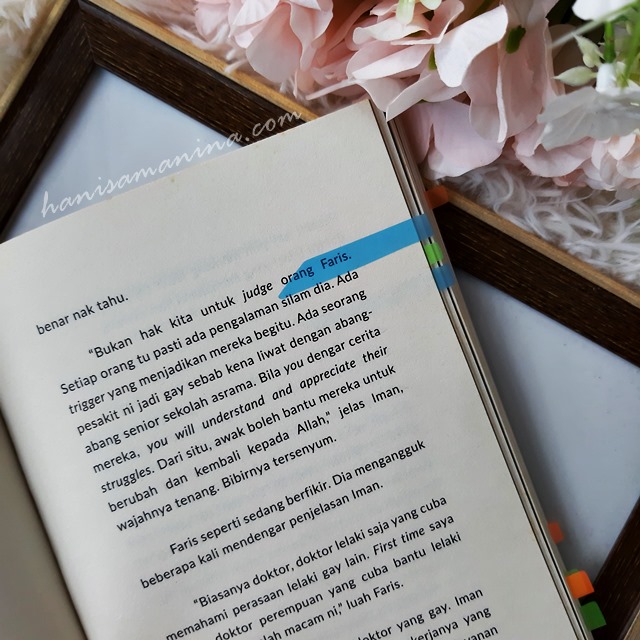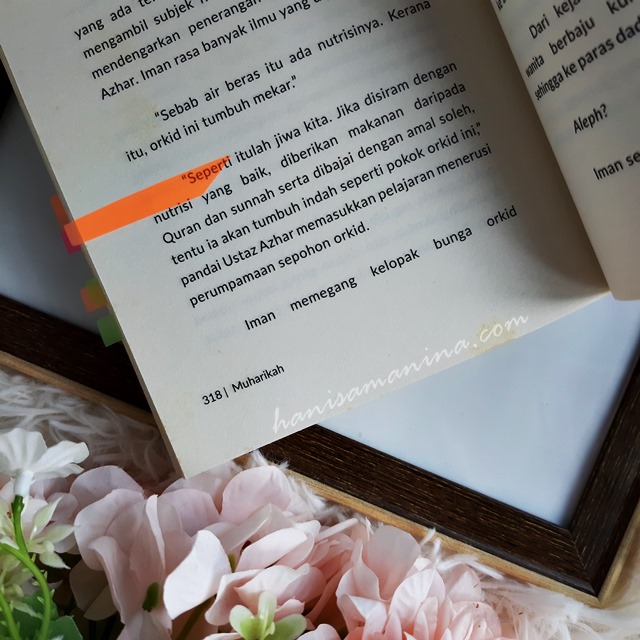I bought Stigma during a book fair if I am not mistaken and finished reading
it at that time. Just because I recently bought the sequels of the novel which
are Karma and Dilema, I decided to reread Stigma so that I don't have to get
confused with the characters. :)
Okay, what can I say about Stigma?
Title: Stigma
Author: Muharikah
Pages: 351
Publisher: Iman Publication
Publication Date: April 2018
Maybe we can start with a rough synopsis?
The novel portrays a life story with a medical background; Dr Iman Syahirah is
the main character in the story, a medical specialist (a.k.a general
physician) in an infectious disease ward, Dr Faris, a medical officer who work
together in the same ward. They are in charge of patients with HIV / AIDS and
the story plays around this topic.
Here come Dr Aleph, a cardiologist who ended up as Dr Iman's best
friend.
One thing that makes me excited (yet scared) - all of them have the same
internal challenge - attracted to same gender but struggling to live a normal,
blessed life.
Yeah, it is scary because it is uncommon for me to see people in medical
fields who are LGBTQ and to be honest I am not sure how to react if I meet
any. T_T There are some people that I know, but we are not that close... so
that's it.
I don't want to comment much on the story line as it really depends on the
preference of readers. Some may say the story presentation is a bit dull as it
contains quite a lot of medical stuffs, but I don't have much problem with it
as I have that background too. Yet, the author already explained every terms
she used.
And maybe I am still a newbie with Malay novels, I find the book to be okay :)
So, as usual, what I love about doing book reviews is more towards what I have
learned from the book hihi... let's go! :)
1. "Cuma Iman takut. Dalam dia menarik orang lain keluar dari kegelapan, mana tahu dia pula yang tenggelam di dalamnya."
This is when Iman shared with her best friend, Zarith after Iman met Aleph in
a conference I think. Aleph is actually a lady whose appearance is like a guy,
a gentleman. At that time, Aleph was actually attracted to Iman and trying to
hit on her.... hehe okay kat sini rasa semacam kejap.
But what I like about both of them, they finally know about each others' past
and struggles to change, even trying to support the process.
About the verses, to be honest, I don't much experience dealing with LGBTQ,
but the verses sound so good, reminds me on how people afraid to get involved
with people having bad issues because they are afraid if in case they got
influenced to do the same.
Here, I am surprised to read that Faris furthered his studies in Jordan, while
Iman in Egypt. Although they were in Islamic countries, they were still
exposed to LGBTQ too. Maknanya, study negara Barat akan terdedah dengan budaya
ni, rupanya di negara Arab sekalipun. Ahaa...
2. "The struggle is real."
This verse is quoted quite a lot through out the book.
When Iman trying to counsel her patients about changing the lifestyle, I
realised people who are LGBTQ somehow know their preferences are wrong but at
the same time, they also feel there's nothing can be done because they are
born that way.
"Tapi, saya tak rasa saya ada pilihan pun, doktor! Dari kecil lagi saya
suka kat lelaki. Saya dah cuba untuk suka perempuan! Saya memang tak
boleh! Saya rasa geli!" - Johan
"Percayalah Johan. Kita semua ada pilihan. Cuma kita selalu biarkan nafsu
dan perasaan buat pilihan untuk kita. I know, the struggle is real. Tapi
yakinlah, jika awak benar-benar mahu berubah, Allah akan bantu awak." -
Iman
From this conversation, I can imagine what if the advice given by Iman was
actually given by someone else who is straight? The LGBTQ may even say that...
"kau tak faham pun perasaan ni", in another word, we are saying out of
empathy. Only if the patient know that the doctor herself was in the same
shoes!
Anyway, yeah. Memang challenging untuk ubah nafsu. The feeling is real. The
love. The preferences.
"Bukan hak kita untuk judge orang, Faris. Setiap orang tu pasti ada
pengalaman silam dia. Ada trigger yang menjadikan mereka begitu. Ada
seorang pesakit ni jadi gay sebab kena liwat dengan abang-abang senior
sekolah asrama. Bila you dengar cerita mereka, you will understand and
appreciate their struggles. Dari situ, awak boleh bantu mereka untuk
berubah dan kembali kepada Allah." - Iman.
This makes me reflects a lot about my impression every time I met patients
with known case of hepatitis, retroviral disease (RVD) etc. Some may even got
the disease from husband / wife or even blood transfusion (though it is rare).
We usually call them as 'biohazard patient', more towards our preparation to
protect ourselves with PPE.
Maksudnya, bila nak ambik darah, kena pakai double gloves - walaupun kalau nak
ditakdirkan tercucuk, tercucuk jugak. Getah lawan jarum, siapa menang? T_T
3. "Hati kita ni, Allah yang punya. Serahkan hati kita kepada Allah."
"Dah lama saya tak dengar orang nasihatkan saya macam ni doktor. Dah lama
juga saya tak jaga solat saya. Asyik tinggal saja." - Johan
" Jangan putus asa, Johan. Allah ada. Awak jaga solat, Allah akan jaga
awak. Awak berdoa dan minta tolong pada Dia, Dia pasti akan bantu awak.
Awak hanya perlu bersungguh-sungguh. Ingat ya, Johan? Hati kita ni, Allah
yang punya. Serahkan hati kita kepada Allah." - Iman
This conversation also reminds me how important of our prayers. I can relate
with my work too. Memang tiap-tiap kali nak pergi kerja, doa banyak-banyak
semoga Allah bantu. Alhamdulillah, even though I feel a bit sad because I
don't have much opportunities to work with female senior doctors, I feel
blessed that most of the male seniors that I've been working with are VERY
HELPFUL. I believe Allah is helping me through them - their knowledge and
experiences.
4. Umat Islam memang memerlukan ramai doktor pakar.
This hits me a lot. Huhuhu. Maybe because I am still contemplating of
furthering studies or simply stay in this position till Allah knows when.
"Dulu, profesor saya pernah nasihatkan, dia cakap: pertama, tak ramai
orang Muslim yang berjaya sempai ke peringkat tertinggi dalam perubatan.
Kedua, bila kita nak treat pesakit kita, rasa lebih nikmat apabila kita
tahu cara terbaik untuk merawat. Bayangkan jika kita tak ada ilmu
perubatan, sedangkan mereka perlukan pertolongan. Bagaimana kita nak
bantu?" - Iman
"Terakhir sekali dia kata, apabila dah jadi specialist, physically kita
akan lebih banyak masa untuk luangkan dengan family kita. Cuma yang
diperlukan adalah otak kita. Gaji pun bertambah, ada waktu hanyak perlu on
call dari rumah sahaja." - Iman
Huhuhu....
Tapi nak sambung belajar balik tu... mashaAllah perasaan dia, serba salah
betul. A lot of things need to be considered - money, place, family the most
important. Based on my seniors sharing, ramai je yang bergolak rumahtangga
bila ada yang sambung belajar. All need patience and understanding, right?
5. Dosa
"Dosa ini, pada awalnya memang kita rasa berat. Rasa gelap. Kita rasa
sesal dan gelisah. Tapi, bila kita dah selalu buat, hati kita akan jadi
gelap dari hari ke hari, sehingga kita tidak lagi merasai bahawa dosa itu
satu dosa." - Ustazah Norhafizah
"Hati kita sudah desensitize dengan maksiat. Apa yang berlaku bila kita
dah tak sensitif? Dosa tu jadi perkara biasa. Kita tak sedar dosa tu satu
kesalahan. Apabla ada orang tegur, kita melenting. Apabila solat, kita dah
tak rasa manis beribadah. Apabila baca Quran, kita susah nak menangis." -
Ustazah Norhafizah
So true.
-----------
Generally, the content is actually heavy but I glad that Muharikah managed to
tackle it and produce the product with a light read :) There are too many
things we can learned from this novel, insyAllah.
Good job, Muharikah :)
I can't wait to share my reviews on the sequels too :D
SM, Perak, Malaysia
200610







